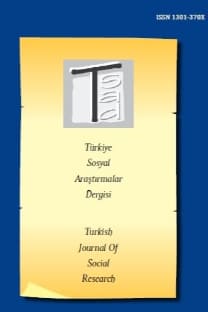BÖLGESEL TİCARETİ ARTIRMA ÇABALARINA YENİ BİR SOLUK: RCEP ANLAŞMASI, TEHDİTLER, FIRSATLAR
Bölgesel ticaret anlaşmaları, RCEP Anlaşması, RCEP Anlaşması ve Türkiye
___
- Asian Development Bank (2021). Asian economic integration report 2021: Making digital platforms work for asia and the pacific, Manila.
- Ateş, E. (2022). Bölgesel kapsamlı ekonomik ortaklık (RCEP) anlaşması üzerine iktisadi bir değerlendirme. Doğu Asya Araştırmaları Dergisi, 5 (9), 44-70.
- Bernanke, S. B. (1983). Irreversibility, uncertainty and cyclical investment. The Quarterly Journal of Economics, 98 (1), 85-109.
- Bhaskar, A. ve Beghin, J. (2009). How coupled are decoupled farm payments? A review of the evidence, Journal of Agricultural and Resource Economics, 34 (1), 130-153.
- DTÖ bölgesel ticaret anlaşmaları veri tabanı, https://rtais.wto.org/UI/PublicMaintainRTAHome.aspx
- European Parliament (2021). Short overview of the regional comprehensive economic partnership (RCEP), Directorate General for External Policies of the Union.
- Flach, L., Hildenbrand, H. ve Teti, F. (2021). The regional comprehensive economic partnership agreement and its expected effects on world trade, IFO Institute.
- Graziano, G. A., Handley, K. ve Limão, N. (2020). Brexit uncertainty and trade disintegration. The Economic Journal, 131 (635), 1150–1185.
- Guiding principles and objectives for negotiating the regional comprehensive economic partnership, rcepsec.org/wp-content/uploads/2019/10/RCEP-Guiding-Principles-public-copy.pdf
- Handley, K. ve Limão, N. (2017). Policy uncertainty, trade, and welfare: Theory and evidence for China and the United States. American Economic Review, 107 (9), 2731-2783.
- İşcan, H. İ. ve Uzunses, F. (2022). Pandemi ve dünya ekonomisinde yeni arayışlar çerçevesinde bölgesel kapsamlı ekonomik ortaklık anlaşması ve Avrupa Birliği-Çin kapsamlı yatırım anlaşması: Bir ekonomi-politik tahlil, Doğuş Üniversitesi Dergisi, 23 (1), 243-264.
- Itakura, K. (2022). Impact of RCEP: A global CGE simulation. 2. Virtual Workshop for the ERIA Research Project on Regional Comprehensive Economic Partnership (RCEP), 25–26 January.
- Itakura, K. ve Lee, H. (2019). Estimating the effects of the CPTPP and RCEP in a general equilibrium framework with global value chains, (Presented at the 22nd Annual Conference on Global Economic Analysis, Warsaw, Poland). Purdue University, West Lafayette, IN: Global Trade Analysis Project (GTAP).
- Jia, F., Huang, X., Xu, X. ve Sun, H. (2020). The effects of economic policy uncertainty on export: A gravity model approach. Prague Economic Papers, 29 (5), 600- 622.
- Kimura, F. (2021). New phase of international trade policy 1: Mega FTAs are the key strategy. Discuss Japan: Japan Foreign Policy Forum, No. 63.
- Kimura, F., Thangavelu, M. S. ve Narjoko, D. (2022). The RCEP and east asian regional integration, (Ed. Fukunari Kimura, Shandre Thangavelu, Dionisius Narjoko) Regional Comprehensive Economic Partnership (RCEP): Implications, Challenges, and Future Growth of East Asia and ASEAN, Economic Research Institute for ASEAN and East Asia (ERIA)
- Krol, R. (2018). Does uncertainty over economic policy harm trade, foreign investment, and prosperity?” Arlington, VA: Mercatus Center at George Mason University.
- Nicita, A. (2021). An assessment of the regional comprehensive economic partnership (RCEP) Tariff Concessions, UNCTAD Research Paper No. 73.
- Nicita, A., Razo, C., Mott, G., ve Peters, R. (2021). A new centre of gravity, The regional comprehensive economic partnership and its trade effects, UNCTAD.
- Park, C. Y., Petri A. P. ve Plummer G. M. (2021). The economics of conflict and cooperation in the Asia-Pacific: RCEP, CPTPP and the US-China trade war, East Asian Economic Review, 25 (3), 233-272.
- Park, I. (2022). Comparison of the regional comprehensive economic partnership (RCEP) and other free trade agreements, (Ed. Fukunari Kimura, Shandre Thangavelu, Dionisius Narjoko) Regional Comprehensive Economic Partnership (RCEP): Implications, Challenges, and Future Growth of East Asia and ASEAN, Economic Research Institute for ASEAN and East Asia (ERIA)
- Petri, A. P. ve Plummer, G. M. (2020). East asia decouples from the United States: Trade war, COVID-19 and east asia’s new trade blocs, Peterson Institute for International Economics Working Paper.
- RCEP Agreement Series, https://rcepsec.org/legal-text/
- Rillo, D. A., Robeniol, M. R. D. A. ve Buban, M. S. (2022). The story of RCEP: History, negotiations, structure and future directions, (Ed. Fukunari Kimura, Shandre Thangavelu, Dionisius Narjoko) Regional Comprehensive Economic Partnership (RCEP): Implications, Challenges, and Future Growth of East Asia and ASEAN, Economic Research Institute for ASEAN and East Asia (ERIA)
- Rosenbaum, Y. C. (2018). RCEP or TPP? An empirical analysis based on global experience. Asian Politics & Policy, 10 (3), 427-441.
- Sarma, N. (2020). Free trade after RCEP: What next for India? Observer Research Foundation Issue Brief, No. 353.
- Schott, J. J. (2022). Which countries are in the CPTPP and RCEP trade agreements and which want in? Peterson Institute for International Economics. (piie.com)
- Shimizu, K. (2021). The ASEAN economic community and RCEP in the world economy. Journal of Contemporary East Asia Studies, 10 (1), 1–23.
- Summary of the regional comprehensive economic partnership agreement, rcepsec.org/wp-content/uploads/2020/11/Summary-of-the-RCEP-Agreement.pdf
- UNCTAD. (2020). RCEP agreement a potential boost for investment in sustainable post-covid recovery, Investment Trends Monitor.
- ISSN: 1301-370X
- Başlangıç: 2015
- Yayıncı: AKADEMİSYENLER BİRLİĞİ DERNEĞİ
BÖLGESEL TİCARETİ ARTIRMA ÇABALARINA YENİ BİR SOLUK: RCEP ANLAŞMASI, TEHDİTLER, FIRSATLAR
Erdem BULUT, Yüksel BAYRAKTAR, Çağlayan ASLAN
TRANSLANGUAGING APPROACH IN WRITING TURKISH AS A SECOND LANGUAGE: AN EXPERIMENTAL STUDY
SİGORTA KARTOGRAFYASININ BATI’DA, OSMANLI DEVLETİ’NDE VE TÜRKİYE’DE DOĞUŞU, GELİŞİMİ VE SON BULMASI
ATASÖZLERİNE YANSIYAN HAYATLAR: GAZİANTEP ATASÖZLERİNDE AİLE
PLANLANMIŞ DAVRANIŞ TEORİSİNİN SLAKTİVİZME ETKİSİ: TWİTTER KULLANICILARI ÜZERİNE BİR ARAŞTIRMA
KURAMDAN DİSTOPİK TOPLUMA TÜKETİM OLGUSU: CESUR YENİ DÜNYA ROMANININ DÜŞÜNDÜRDÜKLERİ
TÜRK DIŞ TİCARETİNİN DEĞİŞEN COĞRAFYASI (1980-2021)
Derya ÇEVİK TAŞDEMİR, Güfte CANER AKIN
TÜRKİYE’DEKİ GÖÇMEN ÇOCUKLARIN EĞİTİM SORUNLARI KONUSUNDA TARİHSEL BİR ÇERÇEVE
